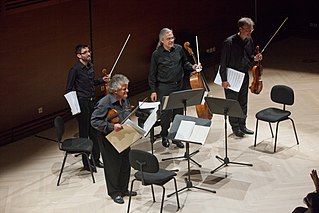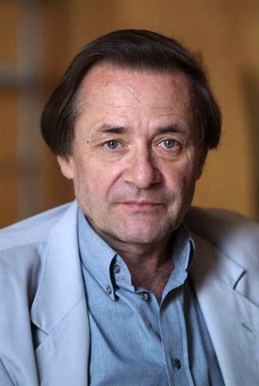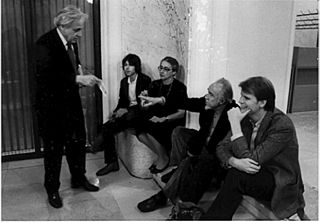Related Research Articles

The Arditti Quartet is a string quartet founded in 1974 and led by the British violinist Irvine Arditti. The quartet is a globally recognized promoter of contemporary classical music and has a reputation for having a very wide repertoire. They first became known taking into their repertoire technically challenging pieces. Over the years, there have been personnel changes but Irvine Arditti is still at the helm, leading the group. The repertoire of the group is mostly music from the last 50 years with a strong emphasis on living composers. Their aim from the beginning has been to collaborate with composers during the rehearsal process. However, unlike some other groups, it is loyal to music of a classical vein and avoids cross-genre music. The Quartet has performed in major concert halls and cultural festivals all over the world and has the longest discography of any group of its type. In 1999, it won the Ernst von Siemens Music Prize for lifetime achievement, being the first and only group to date to receive this award.

György Kurtág is a Hungarian composer of contemporary classical music and pianist. According to Grove Music Online, with a style that draws on "Bartók, Webern and, to a lesser extent, Stravinsky, his work is characterized by compression in scale and forces, and by a particular immediacy of expression". In 2023 he was described as "one of the last living links to the defining postwar composers of the European avant-garde".

Tabea Zimmermann is a German violist who has performed internationally, both as a soloist and a chamber musician. She has been artist in residence of the Concertgebouw Orchestra, the Berlin Philharmonic, and the Bavarian Radio Symphony Orchestra. In 2004, Zimmermann founded the Arcanto Quartet, a string quartet that performed until 2016. Several composers have written music for her, including György Ligeti, and she has made her own version of Bartók's Viola Concerto from the composer's sketches.

András Ligeti was a Hungarian classical violinist and conductor who worked internationally. He was chief conductor of the Hungarian State Opera House until 1985, and chief conductor to the Budapest Symphony Orchestra from 1989 to 1993. He recorded with a focus on Hungarian music and contemporary music.
Manfred Stahnke is a German composer and musicologist from Hamburg. He writes chamber music, orchestral music and stage music. His music makes extensive use of microtonality. He plays piano and viola.
Zsigmond Szathmáry is a Hungarian organist, pianist, composer, and conductor.

The International Society for Contemporary Music (ISCM) is a music organization that promotes contemporary classical music.
The Signum Quartet is a string quartet based in Bremen, Germany. Founded in 1994, it has been playing in the current formation since 2016.

The Cuarteto Casals is a Spanish string quartet based at l'Auditori in Barcelona, where all four members reside and teach at the Escola Superior de Musica de Catalunya.
Magány, sometimes translated into English as Solitude or Loneliness, is an early vocal composition by Hungarian composer György Ligeti to a text by Sándor Weöres. It was finished in 1946 and, as most of Ligeti's early compositions, has followed the musical style of Béla Bartók.

The Hungarian composer György Ligeti published three string quartets: two string quartets proper and a student piece from 1950 published toward the end of his life. The first two quartets represent his early period, inspired by Béla Bartók, and middle period, which was largely micropolyphonic.

Antje Weithaas is a German classical violinist. Apart from solo recitals and chamber music performances, she has played with leading orchestras in Europe, Asia and the United States.
The Philharmonia Quartet Berlin is a string quartet founded in 1985 by members of the Berlin Philharmonic.
The Mendelssohn Scholarship, awarded by the Prussian State from 1879 to 1936, was revived in 1963 by the Prussian Cultural Heritage Foundation. The Foundation awards the Felix Mendelssohn-Bartholdy Prize once a year per competition opened to particularly talented students at one of the 23 recognised music academies in Germany.
The Vogler Quartet is a German string quartet based in Berlin. It was founded in 1985 and has been playing together with an unchanged line-up since 1986.
The Schumann Quartet is a German string quartet founded in Cologne in 2007, consisting of the three brothers Erik Schumann (violin), Ken Schumann (violin) and Mark Schumann (violoncello) as well as the viola player Veit Hertenstein. It is not named after the composer Robert Schumann, but after the three Schumann brothers.
Claudius von Wrochem is a German cellist.
The Bartók Quartet is a Hungarian string quartet ensemble, founded in 1963 in Budapest as the successor ensemble of the Komlós Quartet (1957–63).
The Parker Quartet is a string quartet, formed in 2002 in Boston, Massachusetts. The quartet has since travelled to multiple cities, is currently in residence at the University of South Carolina.
References
- 1 2 Kultur, SWR (23 April 2024). "Streichquartett-Matinee – LIVE". swr.online (in German). Retrieved 21 July 2024.
- 1 2 "Armida Quartett". Gulbenkian Música. 7 February 2017. Retrieved 21 July 2024.
- ↑ "Challenge Records International BV: Armida Quartet". Challenge Records International. Retrieved 11 March 2024.
- ↑ "Das Armida Quartett". Deutschlandfunk (in German). 9 April 2016. Retrieved 21 July 2024.
- 1 2 "Armida Quartett". Bach-Archiv Leipzig (in German). 7 June 2024. Retrieved 21 July 2024.
- ↑ "New Generation Artists: Armida Quartet". BBC Radio 3. Retrieved 10 May 2021.
- ↑ "Rising Stars: Armida Quartet 2017-03-18 kl 15.00". Konserthuset Stockholm. 18 March 2017. Retrieved 21 July 2024.
- ↑ "Armida Quartett". Südwestdeutsches Kammerorchester Pforzheim (in German). 20 September 2020. Retrieved 21 July 2024.
- ↑ McElroy, Siobhan (13 June 2015). "Armida Quartett @ Great Music in Irish Houses". The Journal of Music. Retrieved 21 July 2024.
- ↑ "Martin Funda Lecturer". FORUM artium. 2 May 2024. Retrieved 21 July 2024.
- ↑ "Willkommen bei der Irene Steels-Wilsing Stiftung". Willkommen bei der Irene Steels-Wilsing Stiftung (in German). Retrieved 21 July 2024.
- ↑ e.V., Musikpodium Neuenhagen-Hoppegarten. "Armida Quartett – MUSIKPODIUM". MUSIKPODIUM – Neuenhagen-Hoppegarten e.V. (in German). Retrieved 21 July 2024.
- ↑ "Bestenliste 1-2014". schallplattenkritik.de (in German). 27 February 2017. Archived from the original on 14 June 2019. Retrieved 21 July 2024.